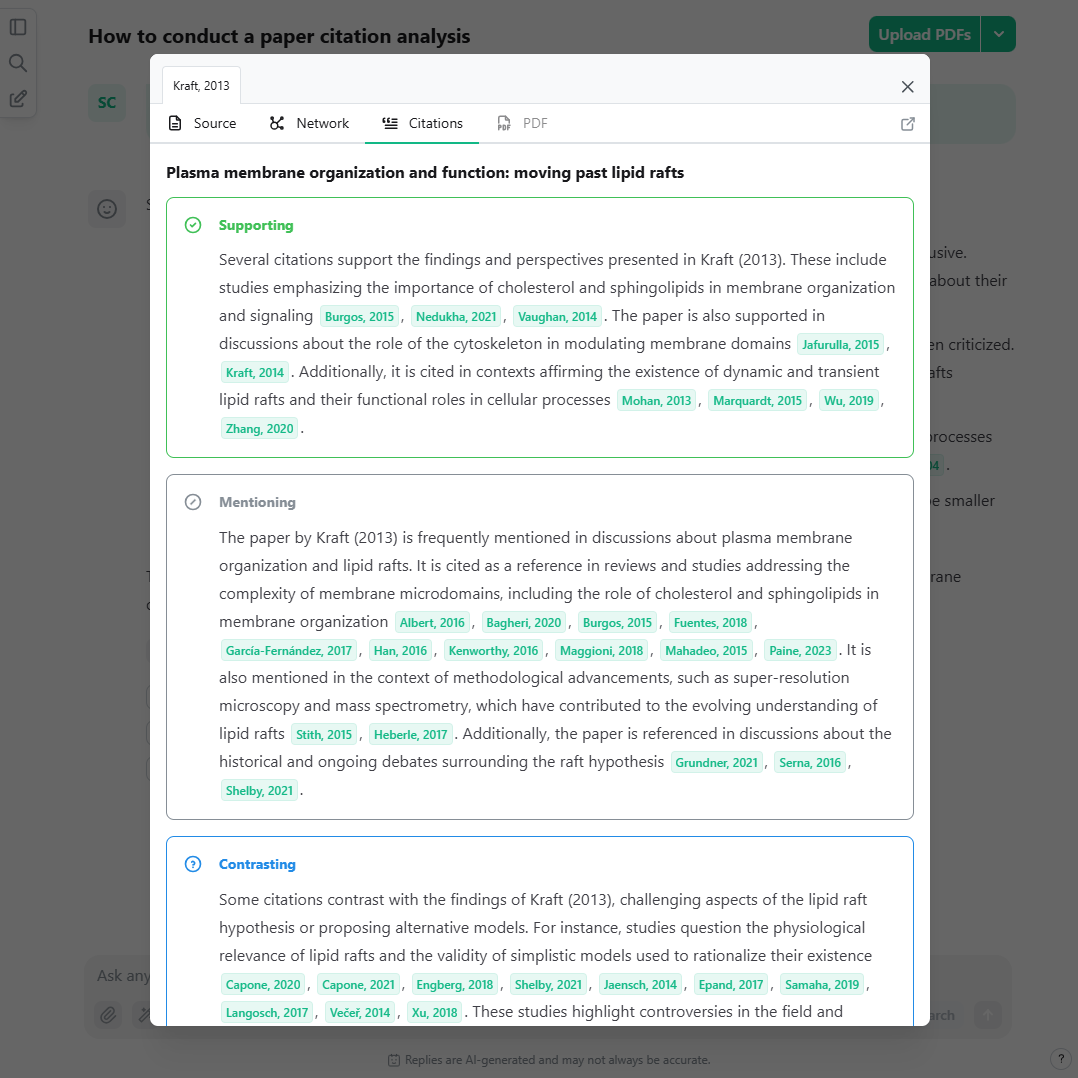Citation analysis and tracking plays a crucial role for researchers at all levels – PhDs, postdocs, principal investigators (PIs), and industry scientists – enabling them to understand the impact of their research. Citation analysis studies how, when, and where others cite research papers in journals. By analyzing these citations, researchers gain deep insights into how their research influences their field and shapes future directions.
The process combines qualitative analysis, such as examining the mentioning, supporting, and contrasting examples within existing literature, with quantitative analysis, through citation metrics such as citations counts, Impact Factor, or the SCImago Journal Rank. This combined approach allows scientists to track evolving trends and refine their academic or industry strategy.

Citation quote analysis. A screenshot showing a citation analysis by scienceOS grouping citation quotes into supporting, mentioning, and contrasting statements.
For instance, it is essential to integrate citation analysis into a literature review for a new project. Understanding whether the identified publications are supported, contrasted, or mentioned in existing research helps refine your hypotheses, identify gaps in the literature, and position your study for optimal relevance and influence.
Building hypotheses on foundational scientific articles that support or challenge your premise strengthens your project and aligns it with key publications that shaped current knowledge. Additionally, citation tracking can reveal potential collaborators frequently referencing your research or working in complementary areas, promoting your impact.
AI research agents like scienceOS simplify citation analysis and tracking, allowing researchers to efficiently evaluate the significance of their papers while refining strategies for broader influence.
Run a citation analysis with an AI agent
The AI citation analysis of scienceOS employs large language models to identify, analyze, and assess the full-text citation quotes of a research paper.
- Login to your scienceOS account and start a new chat.
- Ask a research question. The AI science chat generates an answer, including links to the sources of the information.
- Click on a source to analyze it. You will find all relevant details in the tab ‘Source’ and may create a citation network in the ‘Network’ section.
- Select the ‘Citations’ tab for an overview of the citations. Here, you may discover other studies related to the source and analyze whether they support, mention or contrast the initial source.
- Click on the referenced sources to open them in a separate source tab for additional insights.
Conducting a citation analysis of a single source. A brief video highlighting how to conduct a citation analysis of a single source with scienceOS.
With qualitative analysis and additional features like the citation network, the AI research agent scienceOS offers a clear overview of a research question. Researchers can then analyse a source’s connections to uncover insights, identify key studies, and understand its broader context.
To perform citation analyses directly from specific research papers, you can utilize the AI PDF chat feature. Upload the full-text PDF, and scienceOS will automatically recognize the publication and provide a structured summary of the paper. Once identified, select the source and navigate to the citations tab to generate a citation analysis. This streamlined process provides insights into a document’s research impact without requiring manual organization.
Creating a citation analysis from PDF files. A short video showing how to create a citation analysis based on a PDF with scienceOS.
Further, after transferring your scientific library from a reference manager to scienceOS, you may also conduct a citation analysis using the sources in your library.
Library-based citation analyses. A brief video demonstrating how the scienceOS citation analysis can help find new sources to update a paper library.
Not all scientific articles feature all three categories; some are only mentioned, others provide just supporting examples, and some offer contrasting results. This allows you to check if your reference manager already contains these papers or if you have discovered new sources to complete your collection of literature.
The AI-powered research tool scienceOS is designed for researchers at all stages, offering an efficient way to perform citation analysis. Whether you are beginning with a research question or building upon existing literature, scienceOS supports the process of evaluating and understanding the impact of your research.



